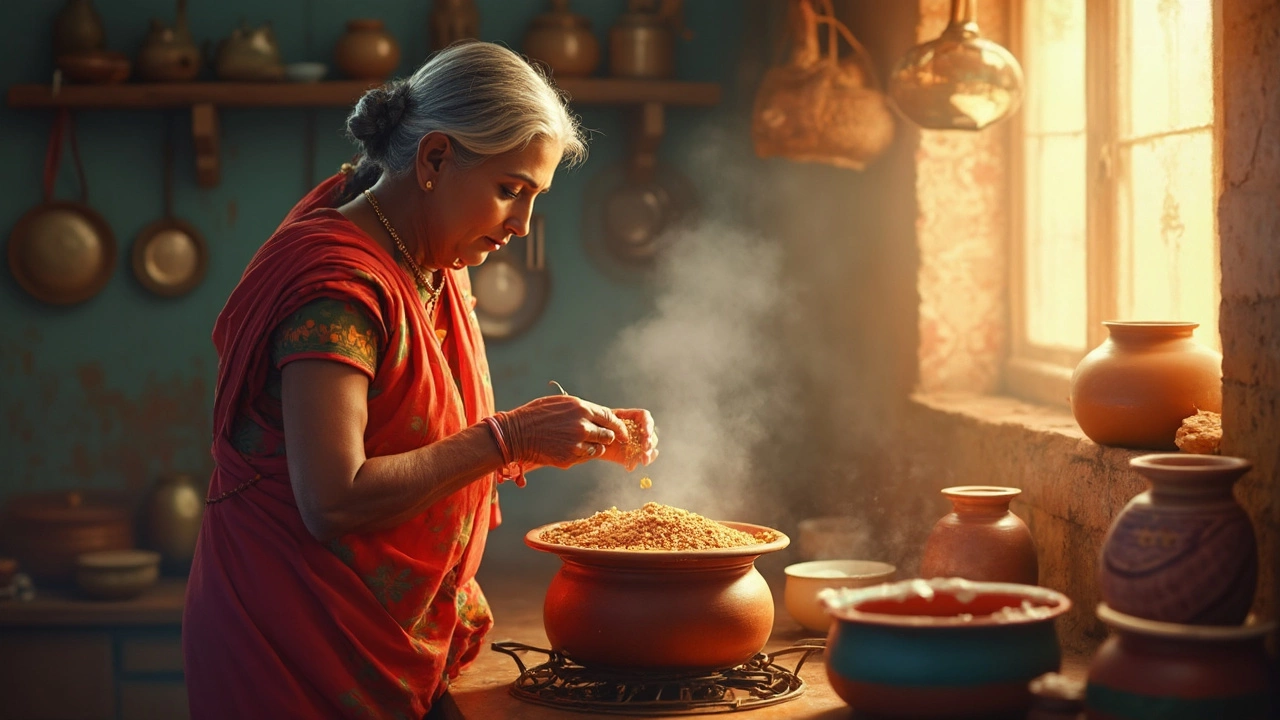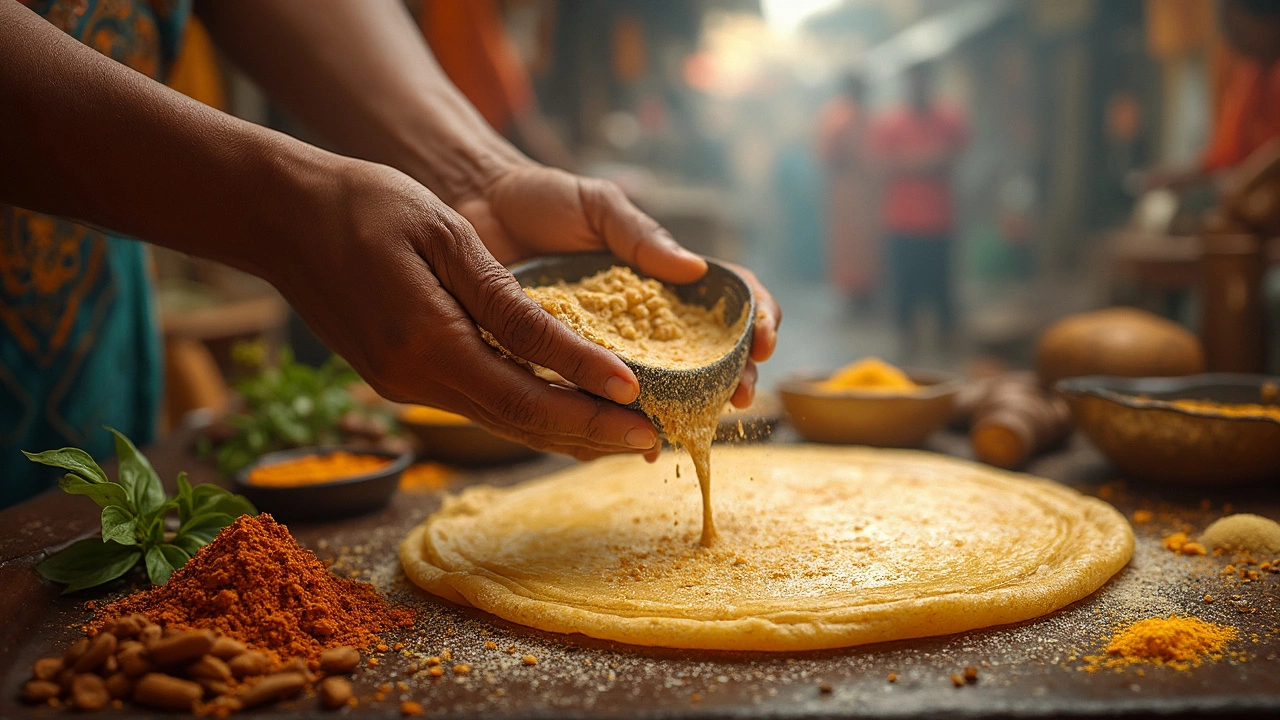How Long Does Urad Dal Need to Soak for Perfect Dosa Batter?
 Feb, 15 2025
Feb, 15 2025
Ever wondered why your dosas aren't as crispy or delicious as you'd expect? One of the hidden secrets lies in how you prep your urad dal. Soaking might sound like a basic step, but it's crucial in getting your dosa batter just right. Usually, soaking urad dal for about 4 to 6 hours is the sweet spot. This timeframe allows the grains to absorb enough water, making them easier to grind and resulting in a smoother batter.
A common misconception is that you can cut corners on soaking time, but that's a surefire way to end up with a subpar batter. The magic of dosas lies in the fermentation, and for that to kick off correctly, your urad dal needs to be well-soaked. So, next time you're gearing up for some dosa-making, remember: patience during soaking actually pays off in flavor and texture.
Why Soaking Matters
You might think soaking is just about softening those rock-hard grains of urad dal, but there's much more going on beneath the surface. Soaking is the unsung hero in Indian cooking, especially when it comes to making that perfect dosa batter recipe. This simple act is the backbone of everything else that follows—grinding, fermenting, and ultimately creating dosas that are light, crispy, and mouth-wateringly good.
Softening the Grains
The prime reason for soaking is to soften the urad dal grains. This makes them easier to grind into a smooth paste, which is so important for the consistency of your batter. A well-soaked grain breaks down with less effort, preventing your blender from overheating and ensuring consistency in your batter.
Kickstarting Fermentation
Soaking isn't just a matter of texture, though. It also sets the stage for natural fermentation. The soaking helps activate enzymes in the urad dal that contribute to fermentation. This is key for that signature dosa tang and fluffiness. In fact, soaking your urad dal long enough can make all the difference between a bland dosa and one that's bursting with flavor.
Nutritional Benefits
Believe it or not, soaking can even make your dosa batter healthier. It helps to neutralize enzyme inhibitors and phytic acid in urad dal, making nutrients more bioavailable. This means you'll get more nutritional bang for your buck with every bite.
Scientific Insights
Studies have shown that soaking grains like urad dal for just a few hours can dramatically alter their biochemistry. Basically, you're making your grains easier for your body to digest. This might sound scientific, but in real life, it translates to dosas that don't just taste great but also feel good in your tummy!
When it comes to perfecting your dosa batter recipe, skipping the soak is like trying to bake a cake without letting the oven preheat—it's a step you definitely don't want to miss out on.
Ideal Soaking Time
Getting your soaking time right is the backbone of nailing that dosa batter recipe. On average, soaking urad dal for about 4 to 6 hours is considered ideal. This duration ensures the dal becomes soft enough to grind smoothly, which is key for your dosa's texture. But why 4 to 6 hours? It's long enough to allow the grains to hydrate completely but not so long that they turn mushy.
Leave them too short, and you’ll find it hard to grind; too long, and fermentation might not occur properly. To keep it simple: soak between breakfast and lunch, and you’ve got it sorted for dinner prep.
Culinary expert Anita Jaisinghani notes, "Properly soaked and well-ground dal is crucial for perfect fermented dosa batter. The soaking time ensures enzyme activation which aids fermentation."
Timing might vary slightly with climate and humidity levels. In cooler regions, you might want to extend it to 8 hours, especially in winter when temperatures can slow down soaking.
Signs of Well-Soaked Dal
- Feels soft and squishy when pinched.
- Grains should break easily, but stay intact if not disturbed.
- The water could appear cloudy - that’s normal!
Old dal or hard water can mess with these timings. If your dal is a bit past its prime, or water isn’t as soft, add an extra hour to your urad dal soaking time. For a smoother grind and resulting batter, having the right water-to-dal ratio is helpful. Consider using filtered water if you’re suspecting tap water as a culprit.

Efficient Soaking Tips
When you're ready to make that perfect bowl of dosa batter, maximizing your urad dal soaking time is key. It's not just about time measurement, though; there are tricks to ensure your soaking process is top-notch.
Use the Right Water
Believe it or not, the type of water makes a difference. If possible, use filtered or distilled water. Tap water, particularly if it's chlorinated, can sometimes hinder the soaking process.
"The quality of water can impact the efficiency of soaking grains," - Culinary Expert Anjali Patil
Kick things off with lukewarm water to accelerate the soaking. Warm water tends to help grains swell quicker, speeding up the absorption process.
Opt for a Suitable Container
Use a wide container or bowl where the urad dal can spread out. This helps expose each grain to water more effectively, ensuring a thorough soak. Avoid crowded, small bowls; they can leave some grains dry. Glass or ceramic bowls are often recommended as they don’t react with the water and exit any unwanted addition of flavor or chemicals.
Check Occasionally
It's a good idea to check the progress halfway through. Gently stir with clean hands or a spoon to ensure even soaking. If you find the water is absorbed too fast, add a bit more lukewarm water. This practice ensures that the grains that might be left sticking to the surface get evenly soaked too.
Timing Your Soak
If you're short on time, don't skimp on the soaking altogether. You can reduce the soaking to 4 hours and then let the dals rest a bit longer while you're preparing other ingredients or cleaning up your kitchen, but for a quality batter, I'd recommend not going below this threshold.
| Soaking Time | Result on Batter |
|---|---|
| Less than 4 hours | Thicker, tougher batter |
| 4-6 hours | Optimal for smooth, creamy batter |
| More than 6 hours | Possible over-soaking, softer batter |
So, next time you're planning to make dosas, keep these tips in mind. They might seem minor, but these tweaks can significantly impact the quality of your homemade dosas. Give it a try – you might just surprise yourself with a restaurant-quality dosa right at home!
Common Mistakes to Avoid
Getting your dosa batter right can sometimes feel like trying to solve a tricky puzzle. Here are some common pitfalls that many people face when preparing their batter, specifically related to soaking urad dal.
Skipping the Rinse
One mistake that often flies under the radar is not rinsing urad dal properly before soaking. This simple step removes dirt and any unwanted residues that could affect the fermentation. Rinse until the water runs clear for best results.
Over-Soaking the Dal
While it might seem helpful, soaking your dal for too long can lead to issues. Over-soaked dal can become mushy and hard to grind, leading to a thick and unfermentable batter. Aim for a 4 to 6-hour window to keep your batter in its prime.
"Patience is great, but too much soaking time can dampen the magic of dosas," says Manju Singh, a renowned dosa chef in Bangalore.
Neglecting Water Quantity
Another tricky part is water. Too little, and the dal won't soak enough; too much, and it can ruin fermentation. A solid rule of thumb? Keep the water level around one inch above the dal. This balance is just right for achieving that perfect texture.
Grind Time Woes
Often, folks underestimate the grinding time needed. Under-grinding leaves your batter grainy and unpleasant. Aim for a smooth paste-like consistency.
Ignoring Temperature for Fermentation
The environment affects soaking and fermentation. Cold temperatures can slow things down, so if you're in a cooler climate, consider soaking and fermenting in a warm area of your kitchen. You could even cover your bowl with a towel for extra warmth.
Remember these points, and you're already steps ahead in creating a flawless dosa batter from urad dal. With these tips, you'll be flipping crispy, tasty dosas in no time!
